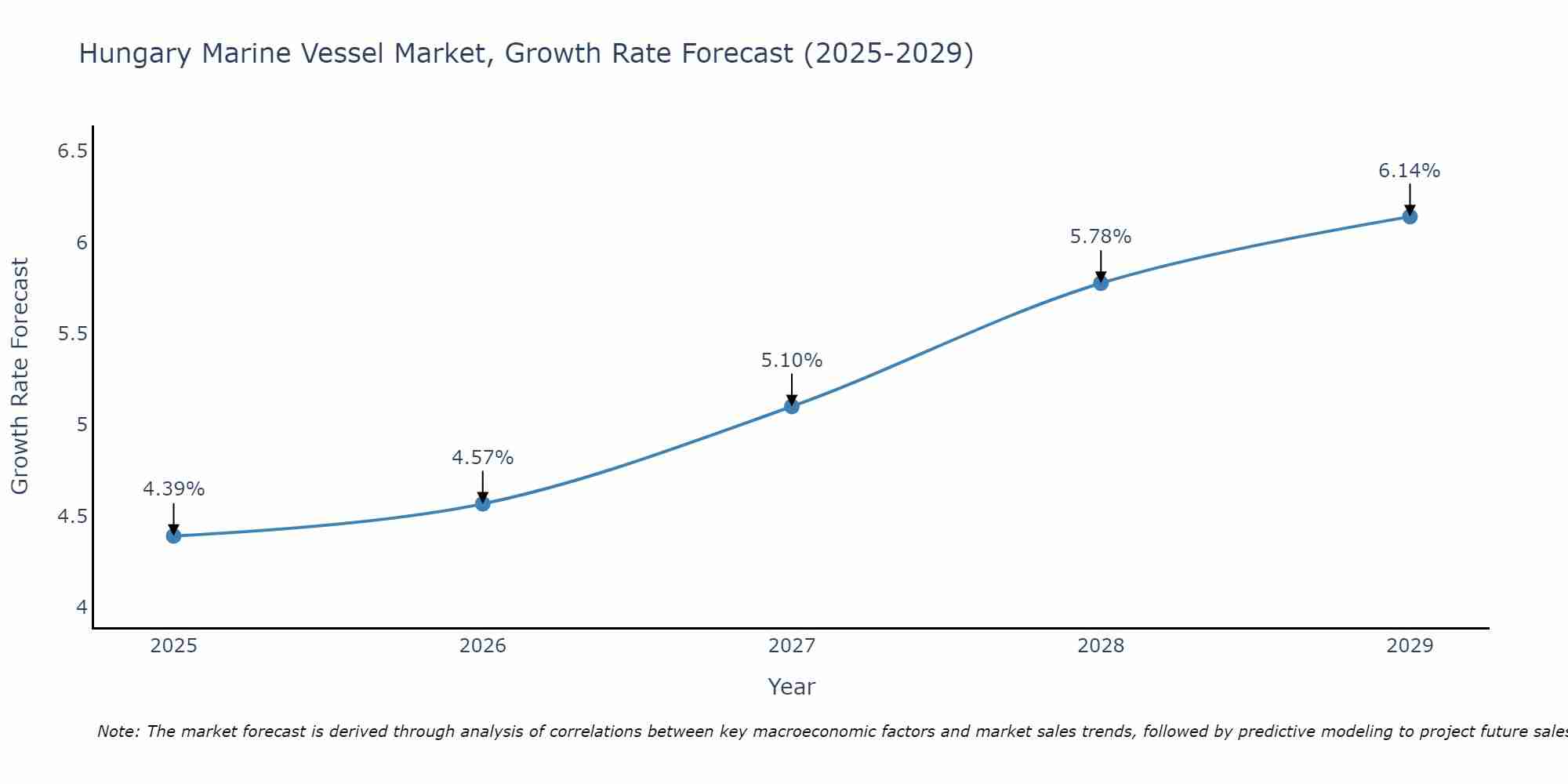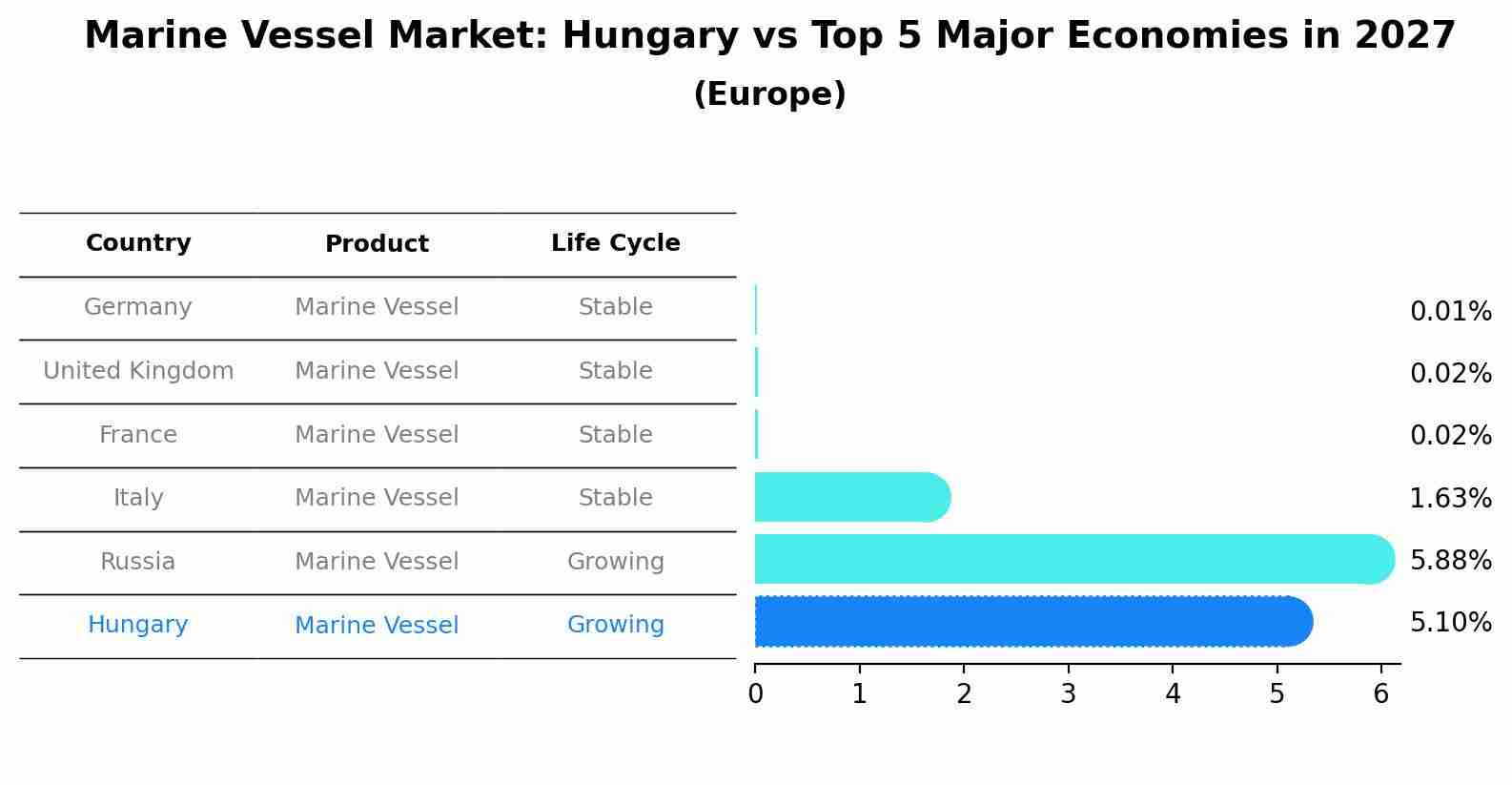Hungary Marine Vessel Market (2025-2031) Outlook | Industry, Size, Share, Growth, Value, Revenue, Companies, Analysis, Trends & Forecast
| Product Code: ETC382999 | Publication Date: Aug 2022 | Updated Date: Jul 2025 | Product Type: Market Research Report | |
| Publisher: 6Wresearch | Author: Summon Dutta | No. of Pages: 75 | No. of Figures: 35 | No. of Tables: 20 |
Hungary Marine Vessel Market Size Growth Rate
The Hungary Marine Vessel Market is poised for steady growth rate improvements from 2025 to 2029. Commencing at 4.39% in 2025, growth builds up to 6.14% by 2029.

Marine Vessel Market: Hungary vs Top 5 Major Economies in 2027 (Europe)
By 2027, the Marine Vessel market in Hungary is anticipated to reach a growth rate of 5.10%, as part of an increasingly competitive Europe region, where Germany remains at the forefront, supported by United Kingdom, France, Italy and Russia, driving innovations and market adoption across sectors.

Hungary Marine Vessel Market Synopsis
The Hungary Marine Vessel Market is a niche segment within the larger European maritime industry, primarily focused on inland waterway transport and recreational boating. The market is characterized by a mix of commercial vessels for cargo transport on the Danube River and various lakes, as well as leisure boats for tourism and personal use. Key players in the market include shipbuilders, boat rental companies, and tour operators catering to both domestic and international clientele. The market is influenced by factors such as regulations governing waterway transport, tourism trends, and economic conditions. While the market is relatively small compared to other European countries with extensive coastlines, there is potential for growth driven by increasing tourism interest in Hungary`s waterways and efforts to promote sustainable transport solutions.
Hungary Marine Vessel Market Trends
The Hungary Marine Vessel Market is experiencing a growing demand for eco-friendly and sustainable vessels, driven by increasing environmental awareness and regulations. There is a rising preference for electric and hybrid-powered vessels, as well as the adoption of advanced technologies such as digitalization, automation, and connectivity to enhance efficiency and safety. The market is also witnessing a shift towards smaller, more maneuverable vessels suitable for recreational activities and tourism. Additionally, there is a focus on improving energy efficiency and reducing emissions in line with global sustainability goals. Overall, the Hungary Marine Vessel Market is evolving towards more environmentally conscious practices and technological innovations to meet the changing demands of both consumers and regulatory requirements.
Hungary Marine Vessel Market Challenges
In the Hungary Marine Vessel Market, some key challenges include limited access to the sea due to its landlocked location, which restricts opportunities for marine vessel operations and trade. Additionally, the market faces competition from neighboring countries with easier access to waterways, impacting the competitiveness of Hungarian marine vessel companies. Infrastructure constraints, such as outdated ports and lack of investment in maritime facilities, also pose challenges for the industry`s growth and development. Regulatory hurdles, including compliance with EU maritime regulations and varying standards across different countries, further complicate operations for Hungarian marine vessel businesses. Overall, navigating these challenges requires strategic planning, investment in infrastructure, and collaboration with international partners to enhance the competitiveness of the Hungary Marine Vessel Market.
Hungary Marine Vessel Market Investment Opportunities
The Hungary Marine Vessel Market offers several investment opportunities, particularly in the areas of shipbuilding, repair, and maintenance services, as well as the transportation and logistics sectors. With Hungary being a landlocked country, the Danube River serves as a vital waterway for trade and commerce, creating demand for marine vessels and related services. Investors can consider opportunities in building and supplying specialized vessels for river transport, as well as offering repair and maintenance services to ensure the efficient operation of existing fleets. Additionally, investing in logistics companies that utilize marine vessels for transportation along the Danube River can also be a lucrative option to capitalize on the growing demand for efficient and cost-effective shipping solutions in the region.
Jordan Agar Market Government Policies
In Hungary, the government regulates the Marine Vessel Market through various policies aimed at ensuring safety, environmental protection, and industry competitiveness. The Hungarian Maritime Administration oversees the registration and certification of vessels, ensuring compliance with international regulations and standards. Additionally, the government provides incentives and support for the development of the marine industry, such as funding programs for research and innovation in vessel technology. Environmental policies also play a significant role, with regulations in place to reduce emissions and protect marine ecosystems. Overall, the Hungarian government`s policies for the Marine Vessel Market focus on promoting sustainable practices, fostering growth in the industry, and ensuring the safety and environmental responsibility of vessel operations.
Hungary Marine Vessel Market Future Outlook
The Hungary Marine Vessel Market is expected to experience steady growth in the coming years, driven by increasing trade activities and investments in the country`s maritime infrastructure. The market is likely to benefit from the expansion of the shipping industry, particularly in the Danube River region, which serves as a key transportation route for goods and passengers. Additionally, the growing demand for eco-friendly and energy-efficient vessels is anticipated to drive innovation and technological advancements in the market. Government initiatives to boost the marine industry and improve waterway connectivity are also expected to bolster market growth. Overall, the Hungary Marine Vessel Market is poised for a positive outlook with opportunities for market players to capitalize on the evolving industry landscape.
Key Highlights of the Report:
- Hungary Marine Vessel Market Outlook
- Market Size of Hungary Marine Vessel Market, 2024
- Forecast of Hungary Marine Vessel Market, 2031
- Historical Data and Forecast of Hungary Marine Vessel Revenues & Volume for the Period 2021 - 2031
- Hungary Marine Vessel Market Trend Evolution
- Hungary Marine Vessel Market Drivers and Challenges
- Hungary Marine Vessel Price Trends
- Hungary Marine Vessel Porter's Five Forces
- Hungary Marine Vessel Industry Life Cycle
- Historical Data and Forecast of Hungary Marine Vessel Market Revenues & Volume By Type for the Period 2021 - 2031
- Historical Data and Forecast of Hungary Marine Vessel Market Revenues & Volume By Commercial Vessel for the Period 2021 - 2031
- Historical Data and Forecast of Hungary Marine Vessel Market Revenues & Volume By Passenger Ship for the Period 2021 - 2031
- Historical Data and Forecast of Hungary Marine Vessel Market Revenues & Volume By LNG/LPG Carrier for the Period 2021 - 2031
- Historical Data and Forecast of Hungary Marine Vessel Market Revenues & Volume By Special Purpose Vessel for the Period 2021 - 2031
- Historical Data and Forecast of Hungary Marine Vessel Market Revenues & Volume By System for the Period 2021 - 2031
- Historical Data and Forecast of Hungary Marine Vessel Market Revenues & Volume By Marine Engine for the Period 2021 - 2031
- Historical Data and Forecast of Hungary Marine Vessel Market Revenues & Volume By Sensor System for the Period 2021 - 2031
- Historical Data and Forecast of Hungary Marine Vessel Market Revenues & Volume By Control System for the Period 2021 - 2031
- Historical Data and Forecast of Hungary Marine Vessel Market Revenues & Volume By Electrical System for the Period 2021 - 2031
- Historical Data and Forecast of Hungary Marine Vessel Market Revenues & Volume By Auxiliary System for the Period 2021 - 2031
- Historical Data and Forecast of Hungary Marine Vessel Market Revenues & Volume By Communication System for the Period 2021 - 2031
- Historical Data and Forecast of Hungary Marine Vessel Market Revenues & Volume By End-use for the Period 2021 - 2031
- Historical Data and Forecast of Hungary Marine Vessel Market Revenues & Volume By Original Equipment Manufacturer (OEM) for the Period 2021 - 2031
- Historical Data and Forecast of Hungary Marine Vessel Market Revenues & Volume By Aftermarket for the Period 2021 - 2031
- Hungary Marine Vessel Import Export Trade Statistics
- Market Opportunity Assessment By Type
- Market Opportunity Assessment By System
- Market Opportunity Assessment By End-use
- Hungary Marine Vessel Top Companies Market Share
- Hungary Marine Vessel Competitive Benchmarking By Technical and Operational Parameters
- Hungary Marine Vessel Company Profiles
- Hungary Marine Vessel Key Strategic Recommendations
Frequently Asked Questions About the Market Study (FAQs):
Export potential assessment - trade Analytics for 2030
Export potential enables firms to identify high-growth global markets with greater confidence by combining advanced trade intelligence with a structured quantitative methodology. The framework analyzes emerging demand trends and country-level import patterns while integrating macroeconomic and trade datasets such as GDP and population forecasts, bilateral import–export flows, tariff structures, elasticity differentials between developed and developing economies, geographic distance, and import demand projections. Using weighted trade values from 2020–2024 as the base period to project country-to-country export potential for 2030, these inputs are operationalized through calculated drivers such as gravity model parameters, tariff impact factors, and projected GDP per-capita growth. Through an analysis of hidden potentials, demand hotspots, and market conditions that are most favorable to success, this method enables firms to focus on target countries, maximize returns, and global expansion with data, backed by accuracy.
By factoring in the projected importer demand gap that is currently unmet and could be potential opportunity, it identifies the potential for the Exporter (Country) among 190 countries, against the general trade analysis, which identifies the biggest importer or exporter.
To discover high-growth global markets and optimize your business strategy:
Click Here- Single User License$ 1,995
- Department License$ 2,400
- Site License$ 3,120
- Global License$ 3,795
Search
Thought Leadership and Analyst Meet
Our Clients
Related Reports
- Saudi Arabia Car Window Tinting Film, Paint Protection Film (PPF), and Ceramic Coating Market (2025-2031) | Strategy, Consumer Insights, Analysis, Investment Trends, Opportunities, Growth, Size, Share, Industry, Revenue, Segments, Value, Segmentation, Supply, Forecast, Restraints, Outlook, Competition, Drivers, Trends, Demand, Pricing Analysis, Competitive, Strategic Insights, Companies, Challenges
- South Africa Stationery Market (2025-2031) | Share, Size, Industry, Value, Growth, Revenue, Analysis, Trends, Segmentation & Outlook
- Afghanistan Rocking Chairs And Adirondack Chairs Market (2026-2032) | Size & Revenue, Competitive Landscape, Share, Segmentation, Industry, Value, Outlook, Analysis, Trends, Growth, Forecast, Companies
- Afghanistan Apparel Market (2026-2032) | Growth, Outlook, Industry, Segmentation, Forecast, Size, Companies, Trends, Value, Share, Analysis & Revenue
- Canada Oil and Gas Market (2026-2032) | Share, Segmentation, Value, Industry, Trends, Forecast, Analysis, Size & Revenue, Growth, Competitive Landscape, Outlook, Companies
- Germany Breakfast Food Market (2026-2032) | Industry, Share, Growth, Size, Companies, Value, Analysis, Revenue, Trends, Forecast & Outlook
- Australia Briquette Market (2025-2031) | Growth, Size, Revenue, Forecast, Analysis, Trends, Value, Share, Industry & Companies
- Vietnam System Integrator Market (2026-2032) | Size, Companies, Analysis, Industry, Value, Forecast, Growth, Trends, Revenue & Share
- ASEAN and Thailand Brain Health Supplements Market (2025-2031) | Strategy, Consumer Insights, Analysis, Investment Trends, Opportunities, Growth, Size, Share, Industry, Revenue, Segments, Value, Segmentation, Supply, Forecast, Restraints, Outlook, Competition, Drivers, Trends, Demand, Pricing Analysis, Competitive, Strategic Insights, Companies, Challenges
- ASEAN Bearings Market (2025-2031) | Strategy, Consumer Insights, Analysis, Investment Trends, Opportunities, Growth, Size, Share, Industry, Revenue, Segments, Value, Segmentation, Supply, Forecast, Restraints, Outlook, Competition, Drivers, Trends, Demand, Pricing Analysis, Competitive, Strategic Insights, Companies, Challenges
Industry Events and Analyst Meet
Whitepaper
- Middle East & Africa Commercial Security Market Click here to view more.
- Middle East & Africa Fire Safety Systems & Equipment Market Click here to view more.
- GCC Drone Market Click here to view more.
- Middle East Lighting Fixture Market Click here to view more.
- GCC Physical & Perimeter Security Market Click here to view more.
6WResearch In News
- Doha a strategic location for EV manufacturing hub: IPA Qatar
- Demand for luxury TVs surging in the GCC, says Samsung
- Empowering Growth: The Thriving Journey of Bangladesh’s Cable Industry
- Demand for luxury TVs surging in the GCC, says Samsung
- Video call with a traditional healer? Once unthinkable, it’s now common in South Africa
- Intelligent Buildings To Smooth GCC’s Path To Net Zero


















